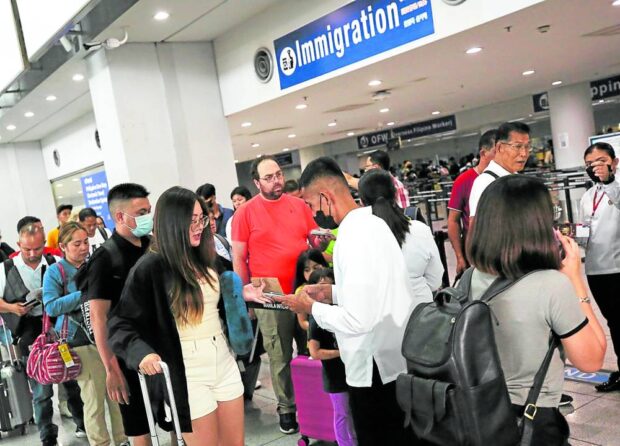Rethink new travel rules – biz, commuter groups

DOCUMENT CHECK | International passengers queue to have their travel documents checked at Ninoy Aquino International Airport Terminal 3 in Pasay City in this photo taken in July 2023. (Photo by RICHARD A. REYES / Philippine Daily Inquirer)
MANILA, Philippines — The influential Philippine Chamber of Commerce and Industry (PCCI) has joined the growing clamor to immediately suspend the implementation of new travel rules issued by the government’s antitrafficking council, on grounds that the latest policy is just too burdensome for the traveling public.
George Barcelon, president of the country’s largest business organization, described the new travel rules as “draconian,” and considers many of the requirements unnecessary.
Last week, the Inter-Agency Council Against Trafficking (Iacat) announced that it will implement revised departure guidelines for Filipinos traveling abroad starting Sept. 3.
Under the new rules, for example, those spending for their own travel overseas will have to show financial capacity or source of income and proof of employment, aside from their roundtrip tickets and hotel bookings.
Then if the trip is sponsored, the traveler will have to present a slew of documents including work visa and overseas employment certificate, notarized affidavits of support and guarantee, and registration papers of the sponsor, on top of the basic passport and tickets.
Given the additional time, effort, and expense to secure the documents, Barcelon said the government should “postpone it and require more discussions.”
He stressed that the PCCI was as concerned about human trafficking as the government, but that there “are [intelligent] ways and means” of addressing it “than [burdening] the traveling community.”
The PCCI official noted that local immigration personnel are already struggling with handling long queues at the airport on average. Thus this unwanted new travel policy will only worsen the situation.
Commuters rights group The Passenger Forum also criticized the new travel policy, citing the same concerns over longer lines in immigration counters and the added costs for the average Filipino traveler.
“It’s costly both in time and in money — the affidavits, and all. They are also asking in one of the requirements that certification is needed from the Philippine consulate,” the group’s convener, Primo Morillo, said in a telephone interview.
Many of the requirements, he said, are redundant, citing in particular the documents submitted to embassies of countries requiring visas.
“For children traveling with parents, they need to show the birth certificate. But a child cannot even get a passport without a birth certificate. This is also the same in showing proof of financial capacity for those already with a visa,” he said.
In light of these burdens, Morillo said the new policy must be suspended, if not altogether scrapped.
Senate probe
Senate President Juan Miguel Zubiri, for his part, went as far as to call the latest set of travel guidelines “unconstitutional,” thus the need for a Senate inquiry into the measure.
During Tuesday’s session, Senate Majority Leader Joel Villanueva said he filed a resolution calling for an inquiry into the latest travel guidelines, expressing dismay that these were adding to the misery of Filipino travelers.
“It’s ridiculous how they (Iacat) want to make their fellow Filipinos suffer more,” he said.
Zubiri supported Villanueva’s move and blasted Iacat for issuing guidelines that supposedly impinged on Filipinos’ right to travel.
In a separate statement, Sen. Nancy Binay called on Iacat to make full use of the advantages of technology, including artificial intelligence, to profile Filipinos traveling overseas.
Binay, chair of the Senate Committee on Tourism, said the use of computer technology could avert possible congestion and delays at immigration counters while pursuing the government’s antitrafficking campaign.
Tapping tech
“The technology already exists to make the screening safe, secure, and convenient for travelers. Technology can likewise be very helpful to curb human trafficking,” she said.
She noted that since outbound passengers had the option to check in online, the airlines’ computer systems could be linked to a highly secure immigration database where red flags would be forwarded to authorities for immediate attention.
“With the advancement of technology in airports and the integrated immigration watch list of governments, analytics or ‘risk scoring algorithms’ can be an extra safeguard to assess high-risk individuals based on a combination of factors like travel behavioral patterns, etc. that would warrant further investigation,” she said.
According to Binay, immigration officers can keep a closer watch on Filipino travelers to countries that are visa-free and with high cases of human trafficking, as approved visa applications have already undergone strict screening by the countries’ embassies in the Philippines.
“We all know that visa applications are all scrutinized for accuracy and consistency. If the applicant shows any inconsistency in the information [they] provided, [they] can expect an outright rejection of [their] application,” she said.
Immigration officials use a combination of methods and criteria to determine travelers who may pose a security risk.
“If they come across a case of a suspicious traveler along with a companion, that’s the time immigration people should do their jobs of cross-checking the [information] they have in their database and compare it to the claims of the person in question,” she said.
The Bureau of Immigration earlier defended the new departure guidelines, claiming that these were just a “clarification” or refinement of existing rules.
They cited Justice Secretary Jesus Crispin Remulla as saying that “more than 95 percent of departing Filipinos would not need to present more documents apart from the basic ones.”